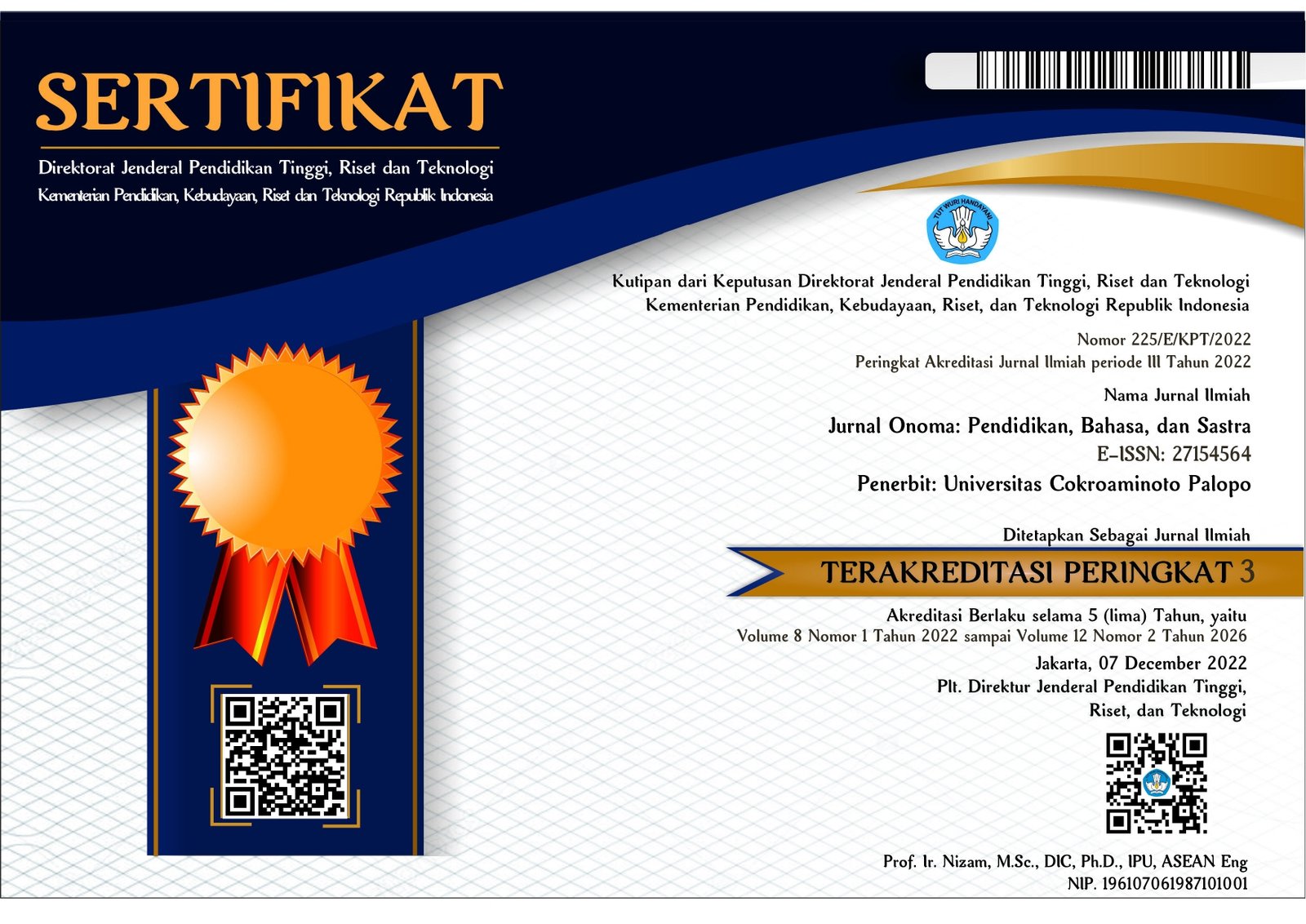Revealing Indonesia through The Grief of Film: Marlina The Murderer in Four Acts
https://doi.org/10.30605/onoma.v11i1.5290
Keywords:
Grief, Film, Marlina The Murderer in Four ActsAbstract
This study is based on qualitative research using the grief of film model in the five stages of Kubler-Ross. The aim is to unveil the grief of the film "Marlina The Murderer in Four Acts" by Mouly Surya, constructed through the exotic cultural anthropology of Indonesia, inspired by a true story in the Sumba region. The research results indicate that the film depicts the character Marlina undergoing a grief process in constructing its narrative. The film's foundation lies in the truth of reality, interpreted through Indonesia's ideology, utilizing the grand power of art and culture. This ultimately gives rise to the concept of the essence of interpreting nationalism through the character 'Marlina' as a representation of marginalized women challenging the nation's reality.
Downloads
References
Carroll, Noel & Jinhee Choi (ed.). 2006. Philosophy of Film and Motion Picture: An Antology, Blackwell Publishing.
Heidegger, M. (2008). Being and Time. (J. Macquarrie and E. Robinson, Trans.). Malden- Oxford-Carlton: Blackwell Publishing.
Izod, J. and Dovalis, J. (2015). Cinema as Therapy: Grief and transformational film. Hove: Routledge. Kübler-Ross, E. (1969) On Death and Dying. New York: Macmillan. DOI: https://doi.org/10.4324/9781315731582
Kübler-Ross, E., & Kessler, D. (2005). On grief and grieving: Finding the meaning of grief through the five stages of loss. New York: Scribner.
McQuail‟s, Denis. 2001. Mass Communication Theory. London. 4th edition: SAGE Publications, Inc.
Neimeyer, R.A., Pennebaker, J.W. and van Dyke, J.W. (2009) ‘Narrative medicine: Writing through bereavement’. In H.M. Chochinov and W. Breitbart (eds), Handbook of Psychiatry in Palliative Medicine. Oxford: Oxford University Press, 454–69.
Downloads
Published
How to Cite
Issue
Section
License
In submitting the manuscript to the journal, the authors certify that:
- They are authorized by their co-authors to enter into these arrangements.
- The work described has not been formally published before, except in the form of an abstract or as part of a published lecture, review, thesis, or overlay journal.
- That it is not under consideration for publication elsewhere,
- That its publication has been approved by all the author(s) and by the responsible authorities – tacitly or explicitly – of the institutes where the work has been carried out.
- They secure the right to reproduce any material that has already been published or copyrighted elsewhere.
- They agree to the following license and copyright agreement.
License and Copyright Agreement
Authors who publish with Onoma Journal: Education, Languages??, and Literature agree to the following terms:
- Authors retain copyright and grant the journal right of first publication with the work simultaneously licensed under Creative Commons Attribution License (CC BY 4.0) that allows others to share the work with an acknowledgment of the work's authorship and initial publication in this journal.
- Authors are able to enter into separate, additional contractual arrangements for the non-exclusive distribution of the journal's published version of the work (e.g., post it to an institutional repository or publish it in a book), with an acknowledgment of its initial publication in this journal.
- Authors are permitted and encouraged to post their work online (e.g., in institutional repositories or on their website) prior to and during the submission process, as it can lead to productive exchanges, as well as earlier and greater citation of published work.

















